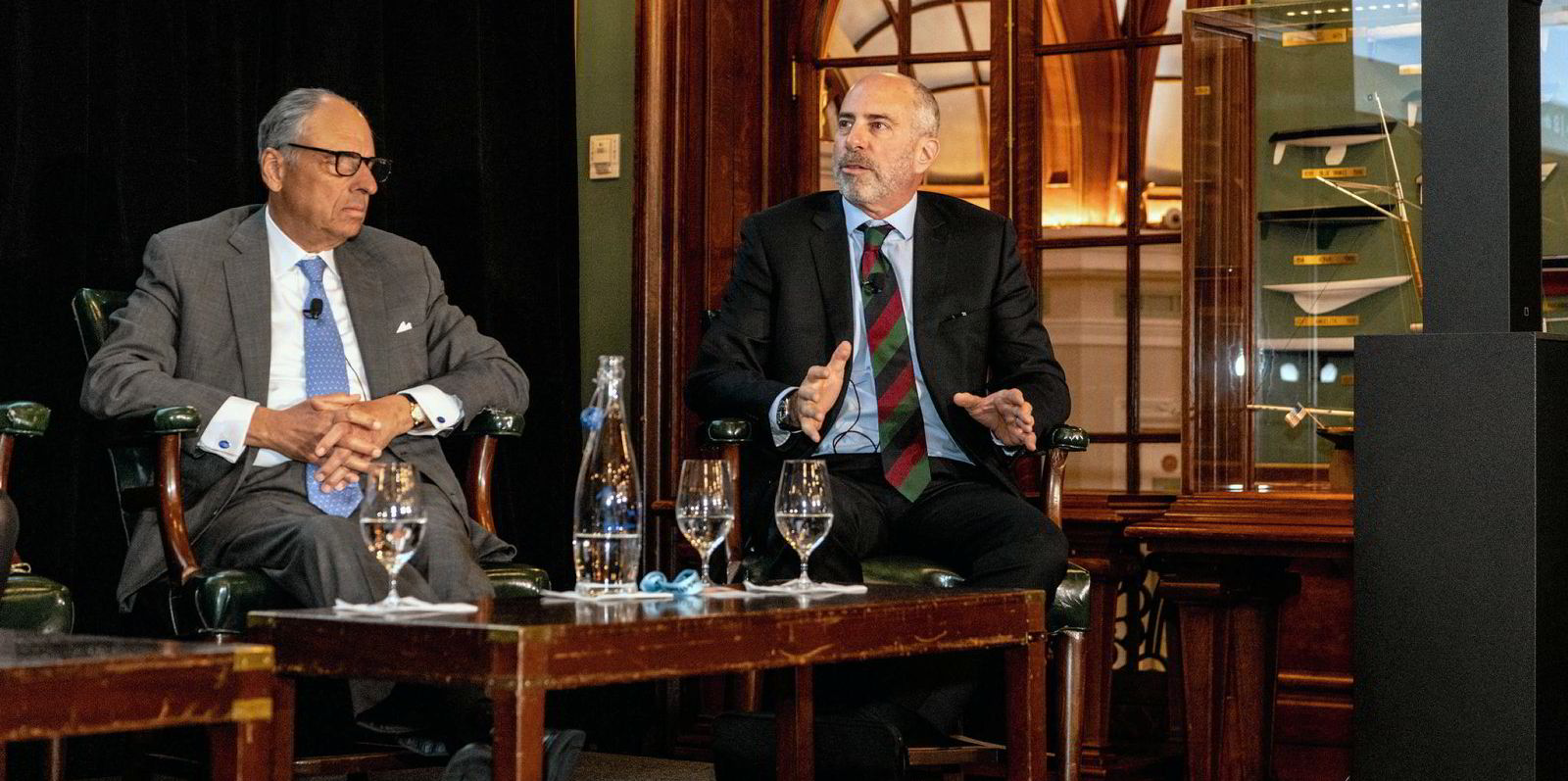Are investors, banks or Wall Street analysts clamouring for New York-listed shipping companies to cut the greenhouse gas footprint of shipping?
It doesn’t appear so, at least according to Scorpio Tankers president Robert Bugbee’s description of the company’s conference calls and one-on-one meetings with investors.
“I cannot remember the last time a single shareholder or analyst asked a question about, ‘What are you doing about reducing your carbon footprint?’” Bugbee told TradeWinds during a panel discussion with leaders of five New York-listed shipowners at this month’s shipowners forum in New York.

Scorpio is not alone. In February, I looked through the transcript of an analyst call for Danish container ship operator AP Moller-Maersk for references to the topic. Not a single analyst mentioned the words carbon, emissions or greenhouse gas.
Lois Zabrocky, the chief executive of tanker owner International Seaways, took a more nuanced view, saying that the interest in carbon cuts depends on geography.
“In Europe, we tend to get more intensive questions around that. I think because it’s a bigger focus in Europe,” she said at the forum, pointing to the carbon credits that shipping companies have to buy since joining the bloc’s Emissions Trading System in January.
But Bugbee countered that investors across the pond were more interested in something else, and that may work against decarbonisation.
“In Europe, the shareholders all want their money back as fast as possible through dividends, so that, by definition, will delay the investment required for the future in new fuels or [reduced] consumption,” he said.

“So I think we’re just in a general mess on that. It’s all talk, it will result in very little action right now.”
It’s not just investors failing to push shipping in a green direction.
Bugbee said alternative fuel adoption is being delayed not only by orderbooks that are full with newbuildings largely being constructed to run on conventional bunkers but also by strong markets that give little incentive to recycle older ships.
And even if lenders wanted to pressure the maritime sector to cut carbon, Bugbee said shipowners don’t need them in strong markets. But where banks are unwilling to lend to tanker owners, they still are showing a willingness to finance offshore oil, the Scorpio president said.
As shipowners face little financial pressure to tackle their climate impact, they can wait for the alternative fuels conundrum to sort itself out.
Overseas Shipholding Group chief executive Sam Norton runs a company that arguably faces a bigger capital expense hurdle for alternative fuels adoption because vessels — in its Jones Act-protected domestic market — are more expensive and have a longer lifespan.
He likened the choice between methanol, ammonia and other fuels to the technology choice between VHS and Betamax video cassette tapes invented in the 1970s. Anyone old enough to have had a Blockbuster Video membership to the former video rental store chain knows which won, but it wasn’t clear when they were introduced.

“In the longer run, I think that the American owners operating in the US-flag sector are going to wait and see what happens in the international market,” he said.
And in the international market, it’s still a wait-and-see scenario as well.

Ardmore Shipping chief executive Anthony Gurnee said the energy transition in shipping will be more prolonged and complex than most people in the industry realise, in part because it takes place in a global environment in which other sectors also need fuels.
For industries such as fertilisers, green ammonia is likely to be a much more economical choice than shipping.
What does that mean for the targets of the International Maritime Organization, which wants shipping to cut emissions by 20% to 30% by 2030 on the way to net-zero greenhouse gas output around 2050?
“I think that the targets that we set for ourselves as an industry in 2030, we’re going to fall well short,” said Gurnee.
“And my only question then is, at what point does it become glaringly obvious and here’s a reckoning from the public about what we’re doing as an industry?”
But Deutsche Bank analyst Chris Robertson offered a ray of hope later in the day, noting the Wall Street controversies about environmental, social and governance factors known as ESG.
“There’s some nihilistic Wall Street philosophers that say ESG is dead. And as it relates to much of the other industries, I think that’s true,” he said.
But not for shipping, because the environmental and governance factors impact a shipowner’s bottom line.
The analyst said a good shipowner with good governance will have better environmental and regulatory compliance, as well as a competitive advantage over those who move more slowly.
Read more
- Photo gallery: Shipping elite gather in the Big Apple for TradeWinds Shipowners Forum
- John Wobensmith reflects on ‘fight letters’ with George Economou and fending off Houthi attacks in the Red Sea
- Geopolitical tensions and transformative forces headline Singapore maritime talks
- Editor’s selection: Middle East at melting point and VLCC investor appetite cooling



